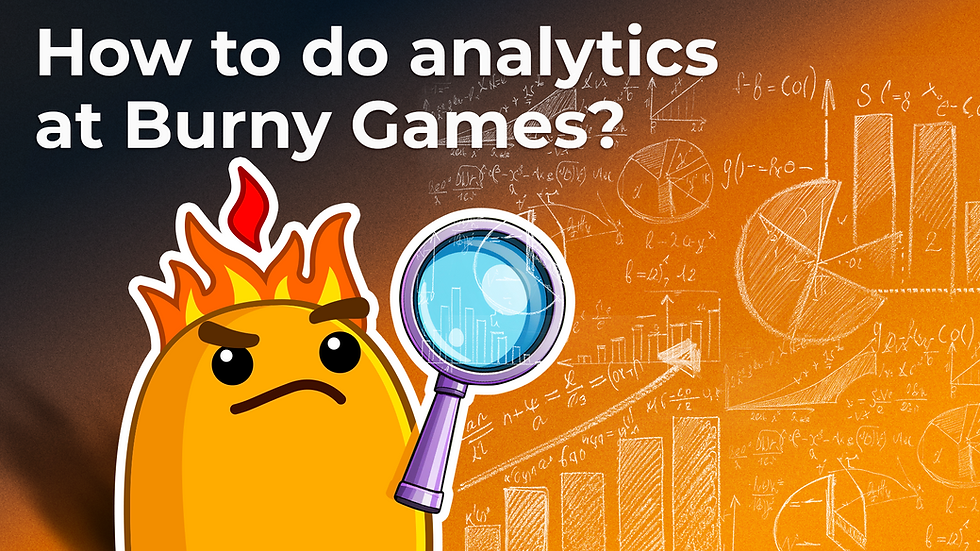The Role of an Analyst at Burny Games: More Than Just Numbers
- Liudmyla Duchak
- Jul 17, 2024
- 3 min read

We firmly embrace a data-driven decision-making philosophy at our company. This approach allows us to avoid major mistakes and more accurately predict product development. In this blog post, we will delve into the data-driven approach and introduce its main "maestro" – the game analyst.
Analyst as a Strategic Partner
"At Burny Games, an analyst is not merely someone who collects and processes data. He or she is a strategic partner who helps the team understand player behavior, identify trends, and make informed, data-backed decisions," explains Anatolii Henis.
The main responsibilities of an analyst in our company include:
- Data Collection and Processing: The analyst works with large volumes of data from various sources, combining them to gain a comprehensive picture.
- Analytical Reports: Creating clear and informative reports for the product team and marketing that help assess the game's effectiveness and make decisions about its development.
- Addressing Product Inquiries: Analyzing data to answer specific questions related to gameplay, monetization, and other aspects of the product.
- A/B Testing: Conducting and analyzing A/B tests to determine the most effective solutions in the game.
- Data-Driven Culture: Fostering a culture where data is used for decision-making, and its critical evaluation is an integral part of the process.
It's imperative that an analyst doesn't just churn out statistics but can explain the underlying trends. Above all, our specialist should have a creative approach to working with data and be able to look at tasks from different angles. This makes the role of an analyst both challenging and exciting: he or she needs to contemplate whether the chosen evaluation method is suitable, whether it's worth running another test, and ensure the validity of the hypotheses. Such skills require specific expertise, so let's take a look at what they are.
Professional Qualities of a Successful Analyst:
- Critical Thinking: The ability to analyze information, identify patterns, and draw conclusions.
- Product Thinking: Understanding player needs, product goals, and how data can help achieve them.
- Analytical and Systems Thinking: The ability to see the big picture and understand how different elements of the game interact.
- Understanding Game Design: Knowledge of game design principles and their impact on player behavior.
If we look more broadly and compile a list of the top 3 skills, it would be: product analytics, data science, and product infrastructure. Specifically, a Burny Games analyst needs to know:
- SQL: Query language for working with databases.
- Python: Programming language with libraries for data analysis.
- Statistics, Probability Theory, and Mathematical Analysis: Theoretical foundation for understanding and interpreting data.
- Visualization Tools: Tableau, Power BI, Google Looker, etc.
- Understanding A/B Testing
Of course, an analyst is not a lone wolf; he or she works closely with producers, marketers, and game designers, providing them with the necessary information for decision-making. Each team member's role at Burny Games is significant; each position is the owner of their process. The quality of each puzzle piece determines the quality of the product and, therefore, the player's fun factor.
The work of an analyst is crucial for the success of the game and the company. Thorough data analysis helps:
- Increase Revenue: Identify opportunities to increase income and optimize expenses.
- Avoid Mistakes: Prevent making wrong decisions that could negatively impact the game.
- Improve Gameplay: Understand what players like and make appropriate changes.
An analyst at Burny Games is not just a data specialist but a key player who helps the company achieve success. Their work influences all aspects of game development and promotion, making it more appealing to players and profitable for the company.
Comments